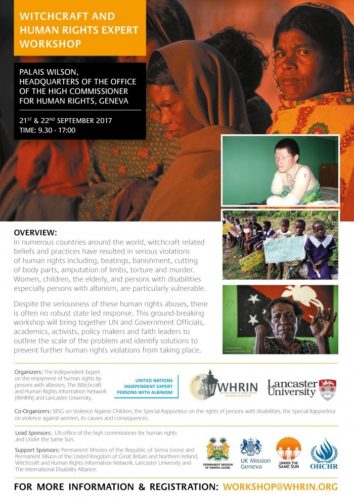TWH – The Times of India reports that “Shanti Devi, a resident of Thethai Andag village, was [killed Tuesday night] on suspicion of practising witchcraft.” 11 assailants reportedly beat her to death and later set her body on fire “to wipe out all evidences connecting them with the crime.”
Kalinga TV offers a similar report. “In yet another superstition-related crime, a man hacked his aunt to death suspecting her to be practicing sorcery before dumping her body on the banks of a river in Thakursahi village.”
The Ghana Web reports that a 63-year-old man has recently come forward to claim that his blindness was caused by his own mother selling his soul so that she could possess witchcraft abilities.
In the Democratic Republic of Congo, the U.N. reports that a militia, made up of mostly children, executed at least 79 people. Survivors of the attacks reportedly told journalists that this militia, called Kamuina Nsapu, has magical powers that make them invincible.

[Courtesy Under the Same Sun]
While horrifying in their number and in their presented detail, the readily-available articles only share the stories making news. Experts agree that many witchcraft-related incidents go completely unnoticed and unreported. As a result, the statistics on witchcraft-related violence are unreliable. Nobody knows just has bad it is.
Although the published reports do regularly populate the international news media, this human rights crisis has gotten very little attention on the international political scene. To date, most of the work has been done by private organizations, such as the Witchcraft and Human Rights Information Network (WHRIN) and Under the Same Sun.
Or it is being handled by local governments, such as in the creation and enforcement of anti-witchcraft accusation laws. Over the past ten years, an increasing number of countries have, in fact, instituted such laws, including Papua New Guinea, India, South Africa, Tanzania, and others.
In 2018, Liberia will play host to a new U.N. human rights office that will reportedly help the country’s government better address, in part, the “accusations of witchcraft and ritualistic killings.”
While these organizations, individuals, and governments appear to making some headway in an effort to stem the tide of abuse, the crisis has yet to be touched on the collective international level.
Until now.
The United Nations Human Rights Council will hold, for the very first time, a special two day workshop on witchcraft-related human rights violations.
As stated on the U.N. site, “[The workshop] will bring together U.N. experts, academics and members of civil society to discuss the violence associated with such beliefs and practices and groups that are particularly vulnerable. It will highlight the various manifestations of witchcraft beliefs and practice, including accusations, stigma, and ritual killings, before looking to identify good practice in combating such practices.”

Human Rights Council, Geneva 2013 [U.S. Mission Geneva/Eric Bridiers].
In a concept note about the upcoming landmark event, the organizing committee statement explains, “Beliefs and practices related to witchcraft vary considerably between different countries and even within ethnicities in the same country. There is overall limited understanding of beliefs in witchcraft, how it may be practised in some cultures, and why.”
The first day includes two morning panel discussions on the overall concept and definition of witchcraft within various cultural settings. It also includes two afternoon panels on the harmful nature and scope of accusations around the globe and how this violence impacts daily lives in “civil society.”
The second day has three panels that focus specifically on the regions that are most affected by the problem: Africa, Asia and Pacific, and Europe. A second panel is devoted to examining witchcraft-related killings, including the discussion of government involvement and legal processes.
In the final panel of the second day, “faith-based organizations” take the stage to address this situation from their perspective. As of now, the panel includes members of the Catholic and Lutheran churches, several academics, and a humanist. Other panelists have yet to be announced.
As written, the upcoming two-day workshop makes little reference to modern Witchcraft as would be commonly understood by much of the Wild Hunt readership. While that point is notable, the Pagan world, as it relates to Witchcraft, was not ignored.
Damon Leff, director of the South African Pagan Rights Alliance, was invited personally by WHRIN’s Gary Foxcroft to be a civil society expert panel speaker. However, due to personal obligations, Leff was unable to accept.
“Although SAPRA regrets that it will not be able to accept an invitation” Leff told The Wild Hunt, “we trust that the discussions and collaborations between U.N. special rapporteurs, academics, and members of civil society organisations dealing with witchcraft accusations in various African countries, will produce not only a shared understanding of the belief systems and mechanisms that lead to violent witchcraft accusations in Africa and elsewhere, but also offer shared solutions to these.”
How the new two-day workshop will lead to global and local change or action with regard to the witchcraft-related human rights crisis is unknown, but both attendees and those watching are hopeful that with this new level of awareness will come stronger and lasting solutions.
Leff, who has been speaking out against such violence in his own country for years, said, “The Witchcraft and Human Rights Expert Workshop is indeed an historic event.”
“Well done to WHRIN for organising [it].”

Editorial Note: The term witchcraft is used with a lower-case in this article to refer to trending abuses and accusations that are typically and completely unrelated to any spiritual or Craft practice. It is capitalized only when referring to modern practice as a recognizable religion, spiritual path, identifier, and Craft.
The Wild Hunt is not responsible for links to external content.
To join a conversation on this post:
Visit our The Wild Hunt subreddit! Point your favorite browser to https://www.reddit.com/r/The_Wild_Hunt_News/, then click “JOIN”. Make sure to click the bell, too, to be notified of new articles posted to our subreddit.